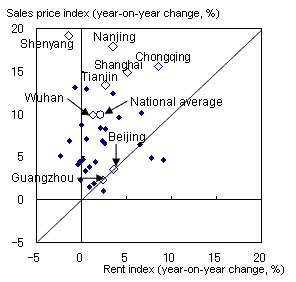China's real estate market remains hot despite moves by the government to tighten money flows to the sector as part of its effort to cool down the economy. A survey of the real estate market conducted jointly by the National Development and Reform Commission and the National Bureau of Statistics released on October 27 shows the price of real estate and land rose 9.9% and 11.6%, respectively, in 35 major cities in the third quarter of 2004 compared to the same period of the previous year. This is intensifying the debate over whether China is experiencing a real estate bubble. Particularly since the central bank announced interest rate hikes on October 28, we need to examine whether the real estate market will continue to boom or enter an adjustment phase.
On the very same day the interest rate hikes were announced, the policy research center of the Ministry of Construction released a report stating the surge in real estate prices was the result of "real demand" brought about by rising incomes and urbanization, not a bubble. The report argued optimistically that if 20% of all urban households in China sought to increase the size of their homes by 20 square-meters, total demand would increase by 500 million-square meters. However, such calculations show potential rather than actual demand. In fact, to an extent unusual for a report issued by a government body, the paper has drawn criticism from the Chinese media for being "propaganda that speaks for industry interests."
Normally, real demand for housing must be backed by purchasing power and profitability. For home-buyers, demand is limited by purchasing power, as measured by the ratio of the house price (or the amount of the loan that must be repaid) to income. If the purchase is an investment made to generate rent income, demand depends on the extent to which the return on the investment as reflected in the rent exceeds the interest rate, which is the cost of procuring funds.
In Shanghai, the price of an 80 square-meter house is 27.5 times annual disposable income of an average household, according to estimates by Liu Jianchang, a researcher at the Chinese Academy of Social Sciences. This compares to a price-to-income ratio for housing of 11.4 in Germany, 10.3 in the United Kingdom, 7.7 in France and 6.4 in the United States. Even in Japan, which is well known as a costly housing market, the figure is about 11. Thus, it must be said that Shanghai is already experiencing a real estate bubble. Although the extent of the surge in housing prices varies by location, owning a home in urban China is beyond the reach of ordinary people.
Meanwhile, according to the real estate market survey cited above, the year-on-year rise in rent levels in the third quarter of 2004 was a scant 2.1%, much lower than the rise in real estate prices (9.9%) Thus, returns on real estate investments in terms of rental income are falling rapidly. The fact that real estate demand is not declining despite this trend shows that purchasers are expecting capital gains, and it is now undeniable that speculation is growing in the real estate market. Judging from the gap between the rise in real estate prices and the rise in rent, the bubble is expanding, not just in coastal cities such as Shanghai and Qingdao, but is also spreading to inland cities such as Shenyang and Wuhan.
In addition to traditional factors such as real demand and speculation, cyclical economic factors are also contributing to the current rise in real estate prices. Because interest rate levels remain low despite rising inflation, captial is flowing from deposits to real estate as a hedge against inflation. Furthermore, restrictions on the supply of land implemented to cool down the overheated economy are also pushing land prices higher. It is unlikely, however, that this situation will continue indefinitely. The government will probably maintain its policies of restraint, based more and more upon indirect measures such as interest rate hikes, rather than administrative measures. In fact, interest rates were raised at the end of October and there is still room for additional hikes. Meanwhile, current restrictions on land supply will probably be eased. As a result, downward pressure on real estate prices will become more and more apparent.
Conditions in the real estate market in China are already flashing warning signs. Unfortunately, as the experience of Japan in the late 1980s shows, the existence of a bubble is often only recognized after it bursts. One hopes China will take steps toward a soft landing as swiftly as possible and not repeat Japan's mistakes.

(Note)The further higher a city is above the 45-degree line, the larger the real estate bubble.
(Source)National Development and Reform Commissio, China


